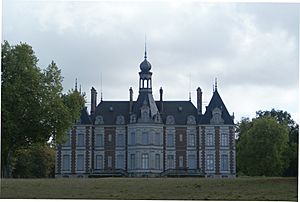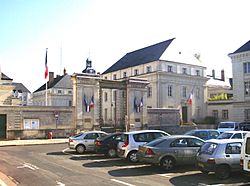Anglo-French Supreme War Council facts for kids
The Anglo-French Supreme War Council (often called the SWC) was a special group formed by Britain and France at the start of World War II. Its main job was to plan and agree on how their armies would fight together. Most of their important talks happened during a quiet period of the war known as the Phoney War. Their first meeting was in France on September 12, 1939. The last few meetings took place in France during the intense German attack in May and June 1940, known as the blitzkrieg.
Contents
Meetings of the SWC
During the Phoney War
The first meeting of the SWC was in Abbeville, France, on September 12, 1939. Britain was represented by Prime Minister Neville Chamberlain. France's team included Prime Minister Édouard Daladier and General Maurice Gamelin.
At this meeting and the next one in Hove, England, on September 22, 1939, they talked a lot about Italy. They wondered if sending troops to places like Salonika or Istanbul would make Italy's leader, Benito Mussolini, angry. France had a huge army ready but not fighting, so they wanted to act. Britain, however, was more careful. At the Hove meeting, they also discussed making more weapons and improving air defences in France.
Later in 1939, at meetings in Paris (November 17) and again in Paris (December 19), the French said no to a British plan. The British wanted to bomb factories in Germany's Ruhr area if Germany invaded Belgium. France worried this wouldn't stop the invasion and would only make Germany bomb Britain and France back.
On February 5, 1940, the SWC met in Paris. This was the first time Winston Churchill, who was in charge of the British Navy, attended. Here, Britain said no to France's idea of sending troops to Petsamo in Finland. France wanted to help Finland in the Winter War against the Soviet Union, but Britain feared this would upset the Soviet Union. However, they did agree to a French plan to send forces to Narvik in Norway, but only if Norway and Sweden agreed. In the end, Norway and Sweden didn't agree because they wanted to stay neutral.
The sixth SWC meeting was in London on March 28, 1940. Paul Reynaud, the new French Prime Minister, was there for the first time. The British strongly opposed French plans to bomb Russian oil fields in the Caucasus. France wanted to cut off Germany's oil supply from Russia. The French did agree to a plan called Operation Royal Marine. This involved floating mines down the Rhine river to damage bridges and stop boat traffic. However, Reynaud couldn't get his own government to agree to mine the Rhine. So, Britain then refused to mine the waters off the Norwegian coast near Narvik.
At this meeting, both countries made an important promise. They said they would not make a peace deal or stop fighting with Germany unless they both agreed. They also promised to keep working together even after the war ended.
On April 5, in Paris, Churchill pushed for Operation Royal Marine again, but France still refused, fearing German attacks. So, Churchill decided Britain would mine the waters off Narvik alone. This plan, called Operation Wilfred, was set for April 8. But before that could happen, Germany launched Operation Weserübung, invading Norway and Denmark.
Paul Reynaud, Édouard Daladier, and Admiral Darlan quickly flew to London for an emergency SWC meeting on April 9. They decided to send a combined British and French force to Norway. But this operation, called Plan R 4, didn't work. They couldn't stop Germany from getting iron ore from Scandinavia, and the troops had to be pulled out in what was known as Operation Alphabet.
Another meeting happened in Paris on April 22 and 23. They agreed that the Allies would keep fighting in Norway, focusing on Trondheim and Narvik. They also decided that the British Air Force (RAF) would bomb the Ruhr if Germany invaded the Netherlands or Belgium.
When the Supreme War Council met on April 27, the French hoped Britain would delay leaving Norway. Reynaud was very angry, saying the British leaders were "old men who do not know how to take a risk." Both sides were upset, with the French feeling betrayed and the British thinking their ally was too emotional.
During the Battle of France
Crisis meetings in Paris
On May 15, at 7:30 in the morning, Winston Churchill, who had only been Prime Minister for five days, received a desperate phone call from Paul Reynaud. Reynaud said France was "beaten" and had "lost the battle." He begged for all the planes and troops Britain could send. Churchill agreed to fly to Paris the next day for an urgent SWC meeting.
On May 16, Churchill arrived in Paris. He found the French leaders almost frozen with fear. General Maurice Gamelin explained that German forces had broken through their lines and advanced very quickly. When Churchill asked about backup troops, Gamelin said there were none. Churchill then asked where Gamelin planned to attack the German breakthrough. Gamelin just shrugged and famously said, "Inferiority of numbers, inferiority of equipment, inferiority of method."
France asked for six more British air squadrons. Churchill explained that Britain needed many fighter squadrons to protect its own factories. He argued that bomber planes would be better used attacking the Ruhr than fighting tanks. However, Churchill later told his own government that more planes should be sent to France, fearing that France might give up quickly. The French felt better, but the extra squadrons were mostly based in England and would only fly over France during the day.
Another SWC meeting took place in Paris on May 22, 1940.
On May 26, Churchill and Reynaud had a private lunch meeting in London. Reynaud hinted that France might have to leave the war. He asked for more British air support and warned that if France lost the battle, General Philippe Pétain would push for a peace deal. It seems Reynaud didn't directly ask Britain to release France from their earlier promise not to make a separate peace.
Later that day, another meeting was held with more British leaders. They discussed an idea to involve Italy in a peace conference. If Benito Mussolini would help protect Britain and France, they could talk about Italy's demands in the Mediterranean. This included areas like French Somaliland and Djibouti. However, the British were against giving up these areas. France did try to approach Mussolini, but he ignored them.
On May 31, 1940, Churchill flew to Paris again for an SWC meeting. Discussions were held about the worsening military situation. Reynaud complained that during the Dunkirk evacuation, called Operation Dynamo, more British troops had been taken off than French. Churchill promised to balance this out. During later talks, a French official mentioned the possibility of France surrendering alone. A British official, General Sir Edward Spears, warned that if France surrendered, Britain would block France and bomb any French ports held by Germany. Churchill declared that Britain would keep fighting no matter what.
Meeting at Briare
The second-to-last meeting was in France on June 11 and 12, at the Chateau du Muguet near Briare. This was where the French army headquarters had moved. Winston Churchill and other British leaders met with the French Prime Minister Reynaud and his cabinet. General Charles de Gaulle was also there. As arguments continued about how much support Britain would give, General Spears realized that "the battle of France was over and that no one believed in miracles." The next day, General Maxime Weygand gave a terrible report on the military situation, making everyone more pessimistic. The British were also worried that the powerful French navy might fall into German hands.
Last-ditch talks at Tours
The very last meeting of the Anglo-French Supreme War Council took place at the government building in Tours, France, on June 13. The British team included Churchill and Lord Halifax. Paul Reynaud, the French Prime Minister, was also there. General Spears noticed the mood was different from the last meeting; it was now like a serious business meeting.
Reynaud stated that unless the United States immediately sent help, the French government would have to stop fighting. He admitted that both countries had promised on March 28, 1940, never to make a separate peace deal. But France, he said, was physically unable to continue. The British were shocked. Churchill firmly said, "We must fight, we will fight, and that is why we must ask our friends to fight on."
Prime Minister Reynaud agreed that Britain would continue the war. He said France would also keep fighting from North Africa if there was a chance of success. But he believed success could only happen if America joined the war. The French leader asked Britain to understand and release France from its promise not to make a separate peace, since France could do no more.
Churchill fails to address French cabinet
The day ended in confusion. Churchill flew back to London without speaking to the French cabinet, even though Reynaud had promised he would. The French ministers were upset and angry. General Spears felt sad, realizing that a chance to change things had been missed. He didn't understand why the meeting hadn't happened. He believed this event helped convince most of the French cabinet to surrender. By the night of June 13, he was sure that "the possibility of France remaining in the war had almost disappeared." The only hope left was if President Roosevelt decided America would join the war.
Organisations associated with the SWC
Besides the main council, there were other groups working together. These included the Anglo-French Purchasing Committee and the Anglo-French Co-ordinating Committee. The Co-ordinating Committee, set up in December 1939, was led by Jean Monnet. It was in charge of planning how Britain and France would work together economically.
In December 1939, Britain and France also signed a financial agreement. They agreed that Britain would pay 60% and France 40% of the war costs, based on how wealthy each country was. They also made agreements about trade and industry. Paul Reynaud said that this teamwork created a strong bond between the two countries, more than just an alliance. They agreed not to change the exchange rate between their currencies during the war.
See also
- Diplomatic history of World War II
 | James B. Knighten |
 | Azellia White |
 | Willa Brown |



